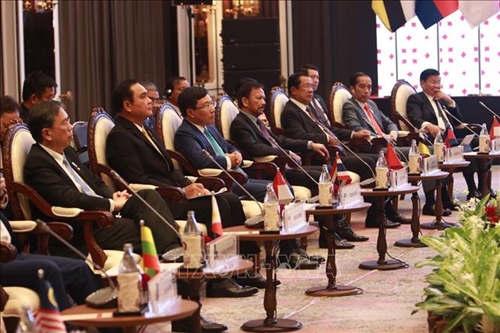AIPA President Chuan Leekpai highlighted the significance of ASEAN-AIPA cooperation on all three pillars of the ASEAN Community, namely politics-security, economy, and society-culture.
He underlined the importance of maintaining the central and unified position of the Association of Southeast Asian Nations (ASEAN) in the regional architecture as well as the demand for stronger cooperation to cope with traditional and non-traditional security challenges.
The AIPA President also affirmed the importance of maritime security in the region and support for cooperation and constructive dialogues in the field.
    |
 |
|
Deputy Prime Minister and Foreign Minister Pham Binh Minh participates in the event |
The ASEAN should prepare to seize opportunities and handle challenges from the Fourth Industrial Revolution while promoting regional economic cooperation, increasing competitiveness, narrowing development gaps, and promoting a green ASEAN, especially doubling efforts to reach the Regional Comprehensive Economic Partnership (RCEP), he said.
The AIPA wants to step up the implementation of ASEAN conventions on the prevention of human trafficking, especially of women and children, including the Bohol Trafficking in Persons (TIP) Work Plan, and ASEAN Consensus on the protection and promotion of the rights of migrant workers, he added.
The ASEAN leaders welcomed the AIPA’s recommendations on promoting cooperation in climate change adaptation, environmental protection, counterterrorism, gender equality, preparation for the Fourth Industrial Revolution, maritime security and safety, and cultural heritage site preservation with a view to build a strong, united ASEAN Community.
While meeting with ASEAN young people, the ASEAN leaders listen to the opinions of young generations on high-quality education, environmental protection, and inclusive development.
The young people suggested creating more opportunities for start-ups and young entrepreneurs as well as increase vocational training and participation of young people in the decision-making process.
At the meeting with representatives of the ASEAN-BAC, the ASEAN leaders took note of the council’s recommendations on making use of digital technology and increasing capacity for small-and medium-sized enterprises (SMEs) besides facilitating trade, digital trade connectivity, liberalization of financial services, development of smart cities, agriculture, tourism, young businesses and women-owned enterprises.
They said the governments of the ASEAN countries will push ahead with the building of the ASEAN Economic Community and increasing regional integration and connectivity as well as reform administrative procedures and devise policies to support SMEs in the digital era.
Source: VNA